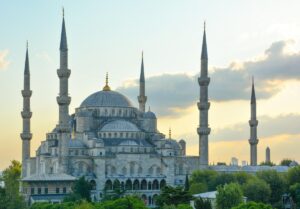CHITRAL: On a recent week long visit to Istanbul, the historic bi-continental city of Turkey, for the main purpose of observing the Turkish model of governance and social structure, following major observations were made by this scribe:
a): While leaving, at the immigration counter of Islamabad airport there are a dozen counters but only three were manned and huge rush had piled up to the sadistic glee of the immigration attendants . When asked a supervisor, why?, few more counters were manned after that. Will Pakistani governance ever improve?
b): The PIA flight to Istanbul from Islamabad was full of passengers. Most were going on through connecting flights further to the west on one pretext or another e.g student visas, work visas etc, while some were visiting Turkey as official delegations aka ‘free lunch’. However the excitement of leaving the country could be read on the faces of every one.
c): Though the PIA was operating the new B 777, but the vedio system was not working throughout the plane both while going and coming.
d): Istanbul airport presented a different world being one of the biggest airports of the world, compared to the feeble, slumbery, Islamabad airport.
e): In Istanbul, public transport in the form of buses, trams, trains, ships is very efficient and organized, while taxi system is not so and the cab drivers try to scam you when they can. Uber etc are discouraged to almost non existence by the taxi mafia.
f): The largest density of crowd ever seen by this scribe worldwide was found in Istanbul. Every street, square, park, was jam packed with more people at any one time more than seen in our biggest political rallies here.
g): Touristic assets like historic palaces, museums, mosques, etc were well managed and heavily charged, at places to the tune of scamming, to earn revenue from tourists which were in abundance from all over the world.
h):Economy is fully digitalized. Even to buy a bottle of coke you have to use your card and every smallest pushcart vendor has a card processing machine. Even to enter toilets for one Lira, cards are to be used, no system of paying cash there.
i): People are visibly very kind to animals. Street dogs and cats are officially vaccinated, are healthy and they are patted and cuddled by passersbys. Feed for birds are put on roofs and front yards by almost one and all (no wonder Allah is kind to them).
j): Turk men are not allowed to marry more than one wife at a time according to their law.
k): Two distinct dress codes of Turk women can be seen in the markets. One with head scarfs and other wearing jeans and blouses.
l): A large number of mosques can be seen every where in the city some as old as four centuries while other built aggressively by the sitting government.
j): A very significant observation was that no politician is allowed to hold any form of asset outside of Turkey. The people are very conscious politically and vote for policies instead of personalities. In the recent Presidential elections 97% people tuned out to vote.
k): Turkish are very stubborn about not learning a second language which is a big problem for tourists.
l): On return flight, the plane was half empty proving the trend of exodus from the country compared to the influx. Among passengers, came across a group of government employees returning after a conference (free lunchers again).
In a nut shell the most important city of Turkey in which you can shuttle between two continents within few minutes is a trove of history, good to be experienced as a tourist. .. CN report, 01 Aug 2023
3 thoughts on “Reflections on a recent visit to Turkey”
Pakistan should also revamp its system on the model of Turkey to make progress in the comity of nations. As the report mentions about ” free lunches” or better called ” parasites on the national exchequer”, following the Turkey-model will be a Herculean task in such a situation where blood-suckers infest the land of pure up and down
Pakistan will need an AtaTurk to put it on the right track. Half-baked weak ‘leaders’ who take one step forward and one back cannot bring about any change.
Read somewhere that Juma khutba is in Turkish. How practical. The prayer goers would at least understand the meaning of what they are listening. Here it is in Arabic which nobody understands, and it flies over the head. Of what use? Either we should have khutba in national language Urdu or change the national language to Arabic. Presently we are living with dichotomy and rote, therefore not benefitting from the teaching of prayers.
Comments are closed.